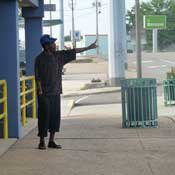Kenosha "Giggles" Johnson has become a staple in Fondren. Often with a blanket in tow, Johnson hangs out in front of businesses along State Street and occasionally receives strange looks from people who walk by.
Johnson often points to the sky and speaks inaudibly to no one in particular. He appears disoriented, and at times he approaches people and makes them uncomfortable, business owners say.
On Tuesday, Aug. 16, Jackson police officers arrested Johnson for panhandling. They held him in the city's jail, but within hours he was back in Fondren, sitting at his usual bench on the corner of State and Mitchell streets. Although many Fondren residents know Johnson and feel uneasy about his arrest, they recognize that there is no easy solution to help him.
JPD has arrested Johnson nearly a dozen times this year. Precinct 4 Commander Wendell Watts said he witnessed Johnson asking people for money on Aug. 16 and, because that breaks a city ordinance, officers took him to jail.
Watts presumed that due to overcrowding, officials released Johnson that same day.
Watts said officers can't take people to a state mental-health facility unless they pose a threat to themselves or others, but will try to take homeless people to a shelter such as Gateway Rescue Mission or the Salvation Army.
"I think we have taken him to the hospital before, and they have deemed him safe enough to be out on the streets," Watts said.
Watts said JPD tries to help the homeless, but they can't always control what happens after shelters work with them.
"We have a process we have to follow in getting help from the shelters," he said. "We try to help the homeless before we do anything as far as jail or mental facilities. People do have hard times and need assistance, but we can't control what these facilities do. ... This is an ongoing issue with a lot of them because it's like they don't want help."
David Waugh, president of the Fondren Association of Businesses, said business owners frequently express concerns about Johnson and other homeless men and women deterring their customers.
"As far as we know, he is harmless to himself and to others," Waugh said.
"He takes care of himself--though not as much as we'd like. But when he is making these noises or threats it becomes scary, and it's rough for these businesses to have someone like that sitting out front."
Waugh said that the only option business owners feel they have is to call the police.
"We have talked to legal counsel about what it takes to remove people from the community," he said. "We did so because we were listening to our membership. ... He is a public nuisance, but he doesn't pose a direct threat, and so there is nothing you can do."
Waugh said he is considering giving Johnson a job such as picking up trash, or providing other opportunities for Johnson to be productive.
"We wish it was a problem that goes away, but we recognize that it's not going to, so how do we find ways to address it?" Waugh asked. "I think we have to learn how to embrace him as a neighbor."
Ron Chane, owner of Swell-O-Phonic, admits that he has called the police on a number of occasions when Johnson has disturbed customers. He said he felt conflicted about calling the police.
"When we first started coming up, everyone was real accommodating to him, but sometimes your desire to want to help gets clouded by the fact that he's a distraction," Chane said. "... He has basically taken up residence here."
Drew Mellon, manager at Swell-O-Phonic, said that Johnson's mental state could be keeping him from getting help.
"I don't know if he has the mental capacity to understand the concept of getting help," Mellon said.
Kathy Denton, public relations director at Mississippi State Hospital, said that residents must first go to a regional state health facility before coming to the state hospital. In Hinds County, residents can seek treatment at Hinds Behavioral Health Services, and staff will then decide if the patient should seek long-term treatment at the state facility. It often takes a family member or friend to bring in someone they are concerned about and continue taking them to appointments.
Dr. Tomora Thomas of Hinds Behavioral Health Services said that her organization will sometimes offer JATRAN bus passes for homeless or needy patients. She also said that case managers are assigned to patients and will follow up with them by visiting them, even if they do not have a home.
"The case manager will visit clients to help determine housing needs, medical needs and psychiatric needs," she said.



Comments
Use the comment form below to begin a discussion about this content.